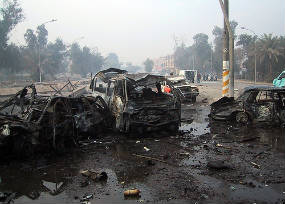
With this morning’s report by the Washington Post that senior leaders of Al Qaeda in Iraq may now be operating in Afghanistan, it’s difficult not to see the decreasing violence in Iraq in a new light. Attacks are way down, yes, and the number of insurgents crossing into Iraq from neighboring countries has fallen to about 20, down from an average of 110 last summer, according to an intelligence analyst interviewed by the Post. But Al Qaeda, despite the intense military pressure being brought to bear on it, has proven to be remarkably resilient and tough to kill, organizationally-speaking.
The problem, according a new report (.pdf) by the RAND Corporation, lies in how we’ve chosen to deal with Al Qaeda. The “War on Terror” paradigm is fundamentally misguided, says Seth Jones, the study’s lead author. “Police and intelligence agencies, rather than the military, should be the tip of the spear against al Qaeda in most of the world.”
To make their case, RAND researchers analyzed 648 terrorist groups that operated between 1968 (the year Palestinian extremists inaugurated terrorism’s modern age) and 2006. How did these terrorist groups meet their end? The study found that 43 percent of them entered the political process, whereas 40 percent were dismantled by the efforts of police and intelligence organizations or by decapitation strikes against their leadership. Just 7 percent were subdued by military force. (The remaining 10 percent of terrorist groups achieved their goals… so don’t believe the mantra that terrorism doesn’t work. Unfortunately, it does, at least on occasion.)
The report’s other findings, as described in a press release:
Photo used under a Creative Commons license from James Gordon.















